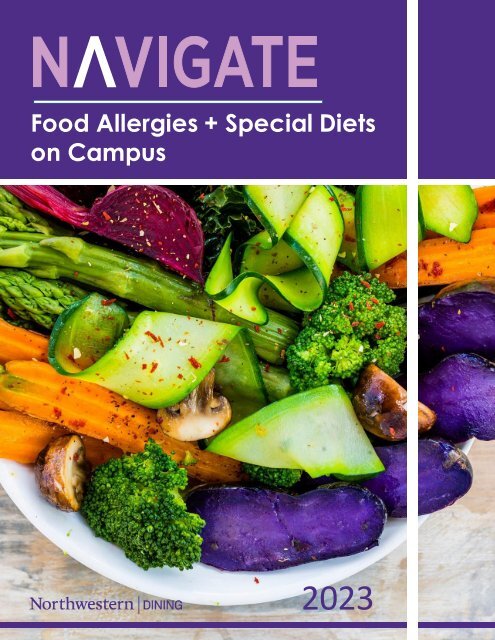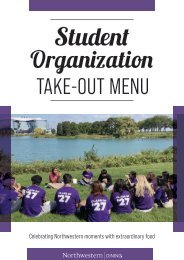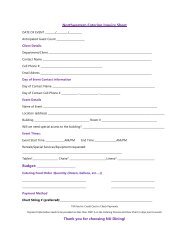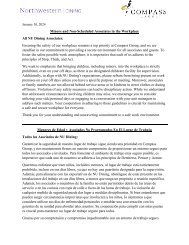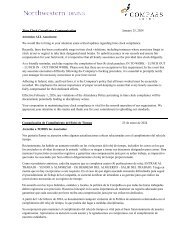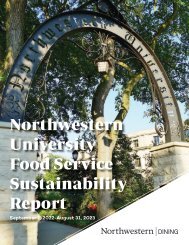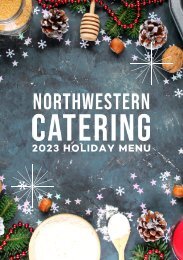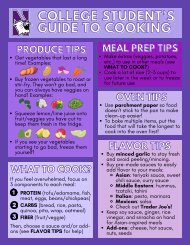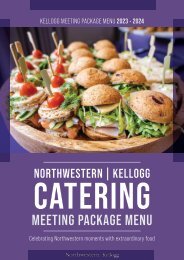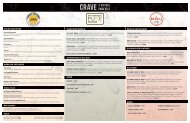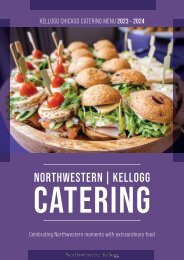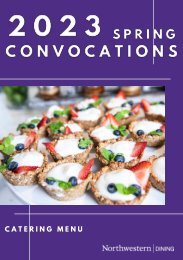2023AllergenGuide_PureEats (1)
You also want an ePaper? Increase the reach of your titles
YUMPU automatically turns print PDFs into web optimized ePapers that Google loves.
Food Allergies + Special Diets<br />
on Campus<br />
2023
Welcome to Northwestern University Dining!<br />
The health and safety of our guests is our highest priority at<br />
Northwestern University and for NU Dining. In support of our<br />
guests with food allergies and other dietary restrictions, we have<br />
created this guide for your reference.<br />
Be aware that we handle and prepare egg, milk, wheat,<br />
shellfish, fish, soy, peanut and tree nut products, sesame, and<br />
other potential allergens in the food production areas of our<br />
facility. We work hard to provide nutrition and ingredient<br />
information that is as complete as possible. Vendors may<br />
substitute ingredients without our knowledge and menu items<br />
are prepared in close proximity to other ingredients that may<br />
result in cross-contact with ingredients not listed, including<br />
allergens.<br />
Guests with food allergies or specific dietary concerns should<br />
always speak to an Ingredient Expert who is the executive chef,<br />
director or manager on staff.<br />
Also remember: Don’t be Shy! Self Identify.<br />
Madeline McDonough, MS, RD, LDN<br />
Campus Dietitian<br />
dietitian@northwestern.edu
our philosophy<br />
NU Dining believes that good nutrition is essential to good health.<br />
That's why we are committed to nourishing each and every<br />
student by providing them with healthy, nutritious foods every<br />
day.<br />
NU Dining supports students who have food allergies by<br />
providing information and knowledge that is necessary to make<br />
informed food choices in all of our dining locations.<br />
We work together to provide reasonable arrangements so that<br />
students may participate in the college dining experience as<br />
much as possible. We recognize that students with food allergies<br />
already experience a more limited diet than those who do not<br />
have an allergy and are required to exert more time and effort<br />
in managing their diet than others. We take into account each<br />
individual student’s personal dietary needs and make every<br />
effort to provide helpful information to those with food allergies.<br />
Our goal is to provide students with the tools that they need to<br />
be active in the management of their food allergy or foodrelated<br />
medical condition within the dining locations. We want<br />
to provide a safe and supportive transition into college life.
food allergies<br />
Background<br />
According to recent large-scale studies on food allergy (FA) prevalence,<br />
more than 32 million Americans have food allergies in the U.S., including more<br />
than 26 million (10.8%) U.S. adults and about 5.6 million (7.6%) U.S. children.<br />
A food allergy can develop at any time with nearly 50 percent occurring for<br />
the first time as an adult. In addition, nearly 19 percent of adults believe they<br />
have a food allergy. These findings suggest that adults with suspected food<br />
allergy receive appropriate confirmatory testing and counseling to ensure<br />
food is only avoided when necessary and that quality of life is not needlessly<br />
compromised. Food allergies can affect one’s breathing, intestinal tract,<br />
heart, and skin. The outcomes can be serious and potentially life-threatening.<br />
Every three minutes a food allergic reaction sends someone to the<br />
emergency room.<br />
What is a Food Allergy?<br />
A food allergy (FA) is an<br />
abnormal immune<br />
response to a food<br />
ingredient, typically a<br />
protein. Food allergic<br />
reactions can vary from<br />
mild symptoms (hives, lip<br />
swelling) to severe and lifethreatening<br />
symptoms,<br />
often called anaphylaxis<br />
(difficulty breathing,<br />
shock). There is no safe<br />
amount of an allergen for<br />
those with life-threatening<br />
food allergies.<br />
Common Food Allergens<br />
Congress passed the Food Allergen Labeling and<br />
Consumer Protection Act of 2004 (FALCPA). This law<br />
identified eight foods as major food allergens: milk,<br />
eggs, fish, shellfish, tree nuts, peanuts, wheat, and<br />
soybean.<br />
On April 23, 2021, the Food Allergy Safety, Treatment,<br />
Education, and Research (FASTER) Act was signed into<br />
law, declaring sesame as the ninth major food<br />
allergen recognized by the United States. This change<br />
became effective on January 1, 2023, when the U.S.<br />
Food and Drug Administration (FDA) labeling<br />
requirement added sesame as the ninth major food<br />
allergen on food packaging labels.<br />
While these nine allergens cause more than 90<br />
percent of food allergic reactions, any food ingredient<br />
can potentially be an allergen, and more than 170<br />
foods have been documented as responsible for an<br />
allergic reaction.<br />
References:<br />
1.Gupta, R. S., Warren, C. M., Smith, B. M., Jiang, J., Blumenstock, J. A., Davis, M. M., Schleimer, R. P., & Nadeau,<br />
K. C. (2019). Prevalence and Severity of Food Allergies Among US Adults. JAMA Network Open, 2(1), e185630.<br />
https://doi.org/10.1001/jamanetworkopen.2018.5630<br />
2.Gupta, R. S., Warren, C. M., Smith, B. M., Blumenstock, J. A., Jiang, J., Davis, M. M., & Nadeau, K. C. (2018).<br />
The Public Health Impact of Parent-Reported Childhood Food Allergies in the United States. Pediatrics, 142(6).<br />
https://doi.org/10.1542/peds.2018-1235
celiac disease<br />
What is Celiac Disease?<br />
Celiac disease is a serious autoimmune<br />
disease in which gluten ingestion damages<br />
the lining of the small intestine.<br />
While not life threatening, celiac disease<br />
can have the following side effects if gluten<br />
is consumed: vomiting, bloating, weight<br />
loss, anemia, chronic fatigue, bone pain<br />
and muscle cramps. Damage occurs to the<br />
intestine and can make it difficult for<br />
someone with celiac disease to absorb<br />
nutrients from the foods they eat.<br />
As many as one in 141 Americans has<br />
celiac disease, although most don't know<br />
it. The only way to manage this disease is<br />
by avoiding gluten.<br />
What is Gluten?<br />
Gluten is a protein commonly found in<br />
certain grains like wheat, rye and barley.<br />
These grains are found in breads, pasta<br />
and snacks and may also "hide" in foods<br />
and ingredients such as soy sauce, salad<br />
dressings, soups, and flavor enhancers.
don’t be shy, self-identify<br />
Student responsibilities when managing a food allergy in the<br />
dining locations:<br />
1 / Notify NU Dining team of your allergy(ies). Schedule a meeting<br />
with our Dietitian, Food Service Director and Executive Chef to<br />
develop a plan so you can navigate the dining halls. Do this by<br />
emailing dietitian@northwestern.edu<br />
2 / Be proficient in the self-management of your food allergy(ies):<br />
- Avoidance of foods to which you are allergic<br />
- Recognition of symptoms of allergic reactions<br />
- How and when to tell someone you might be having an allergyrelated<br />
problem<br />
- Knowledge of proper use of medications to treat an allergic<br />
reaction<br />
- Carry emergency contact information with you at all times<br />
- Review policies/procedures with NU Dining and your physician<br />
should a reaction occur<br />
3 / Read the station signage, menus, and ingredient information<br />
made available upon request and online at Dine on Campus to be<br />
better informed.<br />
4 / When in doubt regarding ingredients in a particular food or dish,<br />
direct your questions to our “Ingredient Expert,” who is also our Food<br />
Service Director, Assistant Director, or Executive Chef. If you do not<br />
know who these individuals are, please ask a cashier or another<br />
employee on duty to contact them.<br />
5 / Due to the nature of the residential dining halls and retail<br />
locations, if you have been prescribed an Epi-pen carry it with you<br />
at all times.<br />
6 / If you notice something that is problematic for your allergy,<br />
please notify our “Ingredient Expert,” who is also our Food Service<br />
Director, Assistant Director, or Executive Chef on duty so that they<br />
can look into your concern.<br />
7 / If you have a question at any point, please ask our “Ingredient<br />
Expert.” If we do not hear from you, we believe that you are<br />
successfully navigating the dining locations.
your responsibilities<br />
It’s our goal to provide students who identify as having food<br />
allergies or intolerances with the necessary information so they<br />
may make confident food choices. It’s pertinent for these<br />
students to help manage their food allergies or intolerances by<br />
doing the following to avoid cross-contamination:<br />
o You may ask a dining employee to change his/her gloves.<br />
o You may ask a dining employee to use a new utensil, or a<br />
fresh pan at made-to-order stations.<br />
o Take caution with deep-fried foods. Frying oil is reused before<br />
being changed. This can lead to cross contact because<br />
food fried in oil releases some of its protein, which is then<br />
absorbed by other foods fried in the same oil. (Examples<br />
include: fried chicken, fried fish, mozzarella sticks, nuggets,<br />
onion rings and French fries). Always ask to see the ingredient<br />
label of products not made in house, such as tater tots and<br />
veggie burgers, to scan for hidden ingredients.<br />
o Take caution with bakery items. Any items prepared onsite<br />
have the potential to have contact with other ingredients in<br />
the kitchen.<br />
o Students may request ingredients that are stored separately<br />
from items displayed at the station.
allergen disclaimer<br />
NU Dining uses manufacturer-provided ingredient information,<br />
and we do not confirm the presence or lack of an allergen.<br />
We periodically review ingredients to verify that ingredient<br />
labeling is consistent with what is provided by the manufacturer.<br />
However, please be advised that ingredients listed may be<br />
subject to change without notification and that products<br />
prepared in our kitchen may have come into contact with<br />
common food allergens.<br />
Please direct any questions regarding an allergy or food<br />
ingredients to any of the Ingredient Experts on duty. For questions<br />
you may also contact our campus dietitian by emailing<br />
dietitian@northwestern.edu<br />
avoid cross contact<br />
Cross-contact occurs when one food comes into contact with<br />
another food and their proteins mix, creating the potential for<br />
an allergic reaction.<br />
We train and educate employees involved in the production<br />
process to change gloves and clean utensils between recipes<br />
to reduce cross-contact concerns.<br />
Always inform the Ingredient Expert of your allergy or dietary<br />
restriction to assess the risk or possible cross-contact in the<br />
meal. Each cook/front-line associate is also instructed to follow<br />
standardized recipes as written so as not to introduce any item<br />
to the recipe that is not on the recipe card.<br />
Frequent production audits are performed to assess recipe<br />
adherence and production processes and to stay informed of<br />
new products being purchased.
your resources<br />
The following services from NU Dining are available to help you<br />
manage your food allergy or allergies:<br />
1 / An individual meeting with the NU Dining Dietitian, Director<br />
and Executive Chef to receive information and develop an<br />
individualized plan to help you navigate the residential dining<br />
facilities.<br />
2 / The Ingredient Experts on duty are available in residential<br />
dining halls to address questions/concerns and serve as<br />
important resources. When in a particular unit, please ask for a<br />
food service manager or email the Dietitian at :<br />
dietitian@northwestern.edu<br />
3 / Access to our Ingredient Expert for ingredient consultation.<br />
4 / Introduction to the dining management team to give you<br />
direct access to individuals responsible for food preparation.<br />
5 /Download the Dine on Campus app or go online and review<br />
daily menus and ingredient lists ahead of time.<br />
6 / Manufacturer-provided entrée ingredient lists, provided<br />
upon request.
your resources<br />
7 / Signage located at each food station in our residential dining locations outlines<br />
nutrition information. Please visit Dine on Campus to access full nutrition labels.<br />
8 / Nutritional information for internally produced retail food and nationally branded<br />
retail items is available online at Dine on Campus . Nutrition information for<br />
purchased or prepackaged retail items is available upon request. If ingredients for<br />
pre-packaged items are not listed on Dine on Campus please email<br />
dietitian@northwestern.edu for ingredient information. Be cautious, as ingredients<br />
listed on Dine on Campus are subject to change. Always consult with an Ingredient<br />
Expert.<br />
9 / Access to the NU Dining culinary team to provide package labels for all dry and<br />
cold food storage items. This ensures you can review ingredients personally to make<br />
the best decisions for your dietary needs. Please schedule advanced notice to<br />
establish the foods you wish to review and on what date/time. Schedule a session<br />
by emailing dietitian@northwestern.edu<br />
10 / Access to individually packaged foods to replace bulk items that have a high<br />
likelihood of cross-contamination (i.e., packets of cream cheese, jelly, and peanut<br />
butter). NU Dining wants you to feel at home in our dining spaces. During your<br />
individual meeting with dining services, please provide a wish list of items that are<br />
your favorites so that we can try and ensure the availability of individually<br />
packaged items for you.<br />
11 / Dining staff are trained to change gloves at least every 30 minutes to minimize<br />
cross-contact concerns.
specific allergy information<br />
Refer to the menus and ingredient information made available to you. We use<br />
manufacturer-provided information, and we do not confirm the presence or lack of an<br />
allergen. NU Dining periodically reviews ingredients to verify ingredient labeling is<br />
consistent with what is provided by the manufacturer. Ingredients listed may be subject<br />
to change without notification.<br />
WHEAT ALLERGIES / AVOIDING GLUTEN<br />
Gluten-free cereals and gluten-free breads are available daily. Other<br />
gluten-free bakery items may be available upon request. Be sure to check<br />
the ingredients of all food items you wish to consume. Look for the Avoiding<br />
Gluten icons on dishes that are prepared in house. We use the term<br />
"Avoiding Gluten" to identify dishes made without gluten containing<br />
ingredients. Since gluten can be airborne for 24 hours we cannot use the<br />
term gluten-free for items made in-house. If you have any questions, just<br />
ask a manager or chef.<br />
MILK ALLERGIES<br />
A non-dairy milk option is available every day in residential dining. However,<br />
milk and milk-based products are ingredients used in many of the menu<br />
items served. Items prepared with butter or margarine should also be<br />
avoided. Please check with a manager or ingredient expert if you have<br />
questions.<br />
SOY ALLERGIES<br />
Soybean is present in a large variety of products. Cooking and frying oils<br />
may be made from soy. While studies have shown that highly refined soy oil<br />
is safe to consume for most with a soy allergy, if a medical professional has<br />
noted that you have a severe allergy, you should consider alternate<br />
options. Please ask a manager if you would like to review the ingredient<br />
label. Avoid products containing soy such as tofu, miso, tempeh,<br />
edamame, soy sauce and tamari. If you have any questions, please ask an<br />
ingredient expert.<br />
*Even foods commonly prepared without gluten-containing ingredients may not be ‘gluten-free.’ Our<br />
recipes are prepared in open kitchens, where cross-contact is possible and where ingredient substitutions<br />
are sometimes made. If you have celiac disease or a gluten sensitivity, please notify your on-site manager<br />
to request an individually prepared avoiding-gluten meal.
specific allergy information<br />
EGG ALLERGIES<br />
Many of our baked goods and desserts contain eggs. Students are<br />
asked to take caution with all baked goods and are encouraged to<br />
check ingredient labels of items they wish to eat.<br />
SHELLFISH ALLERGIES<br />
Avoid entrées and mixed dishes that contain shellfish (such as crab.<br />
Shrimp, lobster, clams, mussels, oysters, octopus) as a main<br />
component. Use caution when selecting Asian dishes, where<br />
shellfish may be included in sauces. Additionally, shellfish are<br />
sometimes found in bouillibaisse, fish stocks, sushi, or seafood<br />
flavoring. Students with shellfish allergies are asked to check the<br />
menus and full ingredient list.<br />
FISH ALLERGIES<br />
Beyond entrées and mixed dishes that contain finfish as a main<br />
component, please use caution when selecting Asian dishes, where<br />
fish may be included in sauces. Additionally, fish is sometimes found<br />
in some gravies, barbecue sauces, Worcestershire sauce, Caesar<br />
salad, sushi, and some dressings. Students with fish allergies are<br />
asked to check the menus and full ingredient list.<br />
PEANUT ALLERGIES<br />
Students with a peanut allergy are advised to take caution with<br />
bakery items. Peanuts are not brought into our kitchen, however<br />
some of our bakery products are manufactured facilities that use<br />
peanuts. Our dining commons offer sunflower butter as a<br />
replacement for peanut butter.<br />
TREE NUT ALLERGIES<br />
Students with a tree nut allergy are advised to take caution with<br />
bakery items. Tree Nuts are not brought into our kitchen, however some<br />
of our bakery products are manufactured in facilities that use tree nuts.<br />
SESAME<br />
Sesame is present in items like hummus, baba ganoush, breads,<br />
bagels, sushi, falafel, tempeh, veggie burgers, and dressings, to<br />
name a few. Students with a sesame allergy should always verify<br />
ingredients with Ingredient Experts.
Pure Eats stations and Pure Eats dining commons feature food that is simply<br />
prepared, seasoned and served by a trained culinary professional. These<br />
meals avoid gluten and the top nine food allergens: peanuts, tree nuts, fish,<br />
shellfish, wheat, soy, eggs, dairy and sesame. Pure Eats is located at all of<br />
our residential dining commons (Allison, Sargent, Elder, and Foster-Walker<br />
East, which is dedicated entirely to Pure Eats).<br />
Avoiding Gluten stations contain a separate toaster, waffle iron,<br />
refrigerator, and pantry for Avoiding Gluten items such as breads, cereals,<br />
waffle mix, and spreads. Avoiding Gluten stations are available in all<br />
residential dining commons.
dietary icons on campus<br />
Foods that contain no animal-based ingredients or<br />
animal by-products including egg, dairy, and honey.<br />
Contains no meat, poultry, fish or seafood but may<br />
contain eggs or dairy.<br />
Menu items made<br />
without gluten<br />
containing ingredients.
allergen reaction<br />
If you are at risk of anaphylaxis, please keep in mind the info<br />
below.<br />
If you have been prescribed an epinephrine auto-injector, keep<br />
it with you at all times!<br />
Wear medical alert identification at all times.<br />
Have an emergency care plan in place. Review these FARE<br />
Resources to create your own individual response plan.<br />
If having a reaction get help immediately!<br />
• Administer your medication (e.g. epinephrine auto-injector)<br />
• Call 911 or ask someone to call for you. Let them know you<br />
are having a food allergic reaction.<br />
• Do not go back to your room alone.
frequently asked questions<br />
1 / Can I assume the ingredients will always be the same in a<br />
common menu item?<br />
Never assume. Although there might be a common item on<br />
the line, don’t assume you know the ingredients. We have<br />
different products based off our vendors’ availability, so an<br />
ingredient we use today can potentially be a different brand<br />
from time to time. The safest and most reliable practice is to get<br />
to know the chefs and managers and always ask questions.<br />
2 / Who should I ask or talk to about a question on the menu?<br />
Always ask the manager or chef. Our trained Ingredient Experts<br />
will be able to ensure you are provided with accurate<br />
ingredient information. You can locate an Ingredient Expert at<br />
each unit by asking one of the line associates to speak to a<br />
management professional to help you navigate our dining<br />
facilities.<br />
3 / What’s the difference between “Gluten-Free” and “Avoiding<br />
Gluten”?<br />
Avoiding Gluten means our products do not include any fresh<br />
or manufactured food that contains gluten. Gluten Free means<br />
the food item contains less than 20 ppm of gluten, which can<br />
only be determined through laboratory testing. Since we<br />
prepare products in common kitchens with shared equipment,<br />
it is not possible that our products can maintain gluten-free<br />
status as established by the manufacturer.
Madeline McDonough, MS, RD, LDN<br />
Northwestern University<br />
633 Clark Street, Evanston IL<br />
dietitian@northwestern.edu


